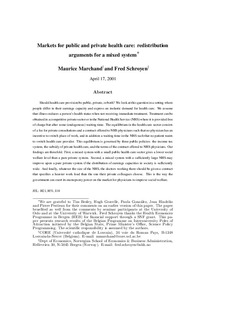Markets for public and private health care : redistribution arguments for a mixed system
Working paper
Permanent lenke
http://hdl.handle.net/11250/163294Utgivelsesdato
2001-04Metadata
Vis full innførselSamlinger
- Discussion papers (SAM) [657]
Sammendrag
Should health care provision be public, private, or both? We look at this question in a setting where
people differ in their earnings capacity and express an inelastic demand for health care. We assume
that illness reduces a person’s health status when not receiving immediate treatment. Treatment can be
obtained in a competitive private sector or in the National Health Service (NHS) where it is provided free
of charge but after some (endogenous) waiting time. The equilibrium in the health care sector consists
of a fee for private consultations and a contract offered to NHS physicians such that no physician has an
incentive to switch place of work, and in addition a waiting time in the NHS such that no patient wants
to switch health care provider. This equilibrium is governed by three public policies: the income tax
system, the subsidy of private health care, and the terms of the contract offered to NHS physicians. Our
findings are threefold. First, a mixed system with a small public health care sector gives a lower social
welfare level than a pure private system. Second, a mixed system with a sufficiently large NHS may
improve upon a pure private system if the distribution of earnings capacities in society is sufficiently
wide. And finally, whatever the size of the NHS, the doctors working there should be given a contract
that specifies a heavier work load than the one their private colleagues choose. This is the way the
government can exert its monopsony power on the market for physicians to improve social welfare.
Utgiver
Norwegian School of Economics and Business Administration. Department of EconomicsSerie
Discussion paper2000:20
